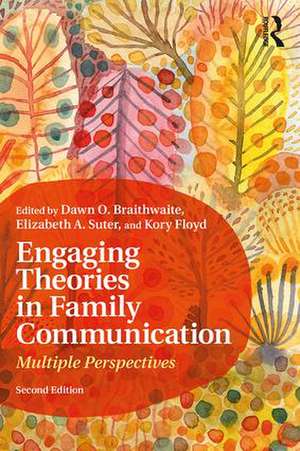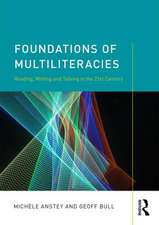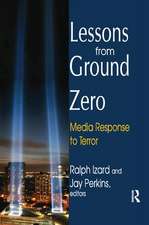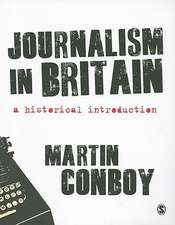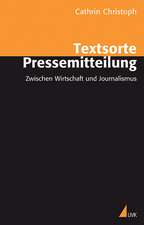Engaging Theories in Family Communication: Multiple Perspectives
Editat de Dawn O. Braithwaite, Elizabeth A. Suter, Kory Floyden Limba Engleză Paperback – 18 sep 2017
Designed for advanced undergraduate and graduate students studying family communication, this text is also relevant for scholars and students of personal relationships, interpersonal communication, and family studies. This second edition includes 16 new theories and an updated study of the state of family communication. Each chapter follows a common pattern for easy comparison between theories.
| Toate formatele și edițiile | Preț | Express |
|---|---|---|
| Paperback (1) | 587.74 lei 6-8 săpt. | |
| Taylor & Francis – 18 sep 2017 | 587.74 lei 6-8 săpt. | |
| Hardback (1) | 1352.01 lei 6-8 săpt. | |
| Taylor & Francis – 14 sep 2017 | 1352.01 lei 6-8 săpt. |
Preț: 587.74 lei
Preț vechi: 691.46 lei
-15% Nou
Puncte Express: 882
Preț estimativ în valută:
112.47€ • 120.26$ • 93.77£
112.47€ • 120.26$ • 93.77£
Carte tipărită la comandă
Livrare economică 17 aprilie-01 mai
Preluare comenzi: 021 569.72.76
Specificații
ISBN-13: 9781138700949
ISBN-10: 1138700940
Pagini: 376
Ilustrații: 3 Tables, black and white; 3 Line drawings, black and white
Dimensiuni: 152 x 229 x 24 mm
Greutate: 0.52 kg
Ediția:2nd edition
Editura: Taylor & Francis
Colecția Routledge
Locul publicării:Oxford, United Kingdom
ISBN-10: 1138700940
Pagini: 376
Ilustrații: 3 Tables, black and white; 3 Line drawings, black and white
Dimensiuni: 152 x 229 x 24 mm
Greutate: 0.52 kg
Ediția:2nd edition
Editura: Taylor & Francis
Colecția Routledge
Locul publicării:Oxford, United Kingdom
Public țintă
Postgraduate and UndergraduateCuprins
Contributor Bios
Preface- Dawn O. Braithwaite, Elizabeth A. Suter, and Kory Floyd
Chapter 1: Introduction: The Landscape of Meta-Theory and Theory in Family Communication Research
Dawn O. Braithwaite, Elizabeth A. Suter, and Kory Floyd
Chapter 2: Affection Exchange Theory: A Bio-Evolutionary Look at Affectionate Communication
Kory Floyd, Colin Hesse, and Mark Alan Generous
Chapter 3: Appraisal Theories of Emotion: How Families Understand and Communicate Their Feelings
Sandra Metts
Chapter 4: Attachment Theory in Families: The Role of Communication
Laura K. Guerrero
Chapter 5: Attribution Theory: Who’s at Fault in Families?
Valerie Manusov
Chapter 6: Communicated Narrative Sense-Making Theory: Linking Storytelling and Well-Being
Jody Koenig Kellas
Chapter 7: Communication Accommodation Theory and Communication Theory of Identity: Theories of Communication and Identity
Jordan Soliz and Colleen Warner Colaner
Chapter 8: Communication Privacy Management Theory: Understanding Families
Sandra Petronio
Chapter 9: Communication Theory of Resilience: Enacting Adaptive-Transformative Processes When Families Experience Loss and Disruption
P.M. Buzzanell
Chapter 10: Critical Feminist Family Communication Theories: Gender, Power, and Praxis
Patricia J. Sotirin and Laura L. Ellingson
Chapter 11: Dyadic Power Theory: Dominance and Power in Family Communication
Norah E. Dunbar and Aubrie Adams
Chapter 12: Facework Theory: Performing Familial Roles in Everyday Interactions
M. Chad McBride
Chapter 13: Family Communication Patterns Theory: A Grand Theory of Family Communication
Ascan F. Koerner, Paul Schrodt, and Mary Anne Fitzpatrick
Chapter 14: Four Horsemen of the Apocalypse: A Framework for Understanding Family Conflict
Loreen N. Olson and Annalisa Donahey
Chapter 15: General Systems Theory: A Compelling View of Family Life
Christina G. Yoshimura and Kathleen M. Galvin
Chapter 16: Intersectionality: (Re)Considering Family Communication from Within the Margins
April L. Few-Demo, Julia Moore, and Shadee Abdi
Chapter 17: Language Convergence/Meaning Divergence Theory: Creating Conflict Through Misunderstandings
Debbie S. Doughtery
Chapter 18: Multiple Goals Theories: Motivations for Family Interactions and Relationships
Steven R. Wilson and John P. Caughlin
Chapter 19: Narrative Performance Theory: Making Stories, Doing Family
Kristin M. Langellier and Eric E. Peterson
Chapter 20: Necessary Convergence Communication Theory: Submission and Power in Family Communication
Michelle Miller-Day
Chapter 21: Negotiated Morality Theory: How Family Communication Shapes Our Values
Vincent R. Waldron and Douglas L. Kelley
Chapter 22: Relational Dialectics Theory: Realizing the Dialogic Potential of Family Communication
Elizabeth A. Suter and Leah M. Seurer
Chapter 23: Relational Turbulence Theory: Understanding Family Communication During Times of Change
Leanne K. Knobloch, Denise Haunani Solomon, Jennifer A. Theiss, and Rachel M. McLaren
Chapter 24: Social Construction Theory: Communication Co-Creating Families
Dawn O. Braithwaite, Elissa Foster, and Karla M. Bergen
Chapter 25: Social Exchange Theory: A Cost-Benefit Approach to Relationships
Laura Stafford
Chapter 26: Social Learning Theory: An Emphasis on Modeling in Parent-Child Relationships
Alesia Woszidlo and Adrianne Kunkel
Chapter 27: Structuration Theory: Applications for Family Communication
Kristen Norwood and Paaige K. Turner
Chapter 28: The Theory of Natural Selection: An Evolutionary Approach to Family Communication
Kory Floyd, Dana R. Dinsmore, and Corey A. Pavlich
Chapter 29: Theory of Resilience and Relational Load (TRRL): Understanding Families as Systems of Stress and Calibration
Tamara D. Afifi and Kathryn Harrison
Chapter 30: Uses and Gratifications Theory: Considering Media Use in the Context of Family Communication
Jeffrey T. Child and Paul Haridakis
Preface- Dawn O. Braithwaite, Elizabeth A. Suter, and Kory Floyd
Chapter 1: Introduction: The Landscape of Meta-Theory and Theory in Family Communication Research
Dawn O. Braithwaite, Elizabeth A. Suter, and Kory Floyd
Chapter 2: Affection Exchange Theory: A Bio-Evolutionary Look at Affectionate Communication
Kory Floyd, Colin Hesse, and Mark Alan Generous
Chapter 3: Appraisal Theories of Emotion: How Families Understand and Communicate Their Feelings
Sandra Metts
Chapter 4: Attachment Theory in Families: The Role of Communication
Laura K. Guerrero
Chapter 5: Attribution Theory: Who’s at Fault in Families?
Valerie Manusov
Chapter 6: Communicated Narrative Sense-Making Theory: Linking Storytelling and Well-Being
Jody Koenig Kellas
Chapter 7: Communication Accommodation Theory and Communication Theory of Identity: Theories of Communication and Identity
Jordan Soliz and Colleen Warner Colaner
Chapter 8: Communication Privacy Management Theory: Understanding Families
Sandra Petronio
Chapter 9: Communication Theory of Resilience: Enacting Adaptive-Transformative Processes When Families Experience Loss and Disruption
P.M. Buzzanell
Chapter 10: Critical Feminist Family Communication Theories: Gender, Power, and Praxis
Patricia J. Sotirin and Laura L. Ellingson
Chapter 11: Dyadic Power Theory: Dominance and Power in Family Communication
Norah E. Dunbar and Aubrie Adams
Chapter 12: Facework Theory: Performing Familial Roles in Everyday Interactions
M. Chad McBride
Chapter 13: Family Communication Patterns Theory: A Grand Theory of Family Communication
Ascan F. Koerner, Paul Schrodt, and Mary Anne Fitzpatrick
Chapter 14: Four Horsemen of the Apocalypse: A Framework for Understanding Family Conflict
Loreen N. Olson and Annalisa Donahey
Chapter 15: General Systems Theory: A Compelling View of Family Life
Christina G. Yoshimura and Kathleen M. Galvin
Chapter 16: Intersectionality: (Re)Considering Family Communication from Within the Margins
April L. Few-Demo, Julia Moore, and Shadee Abdi
Chapter 17: Language Convergence/Meaning Divergence Theory: Creating Conflict Through Misunderstandings
Debbie S. Doughtery
Chapter 18: Multiple Goals Theories: Motivations for Family Interactions and Relationships
Steven R. Wilson and John P. Caughlin
Chapter 19: Narrative Performance Theory: Making Stories, Doing Family
Kristin M. Langellier and Eric E. Peterson
Chapter 20: Necessary Convergence Communication Theory: Submission and Power in Family Communication
Michelle Miller-Day
Chapter 21: Negotiated Morality Theory: How Family Communication Shapes Our Values
Vincent R. Waldron and Douglas L. Kelley
Chapter 22: Relational Dialectics Theory: Realizing the Dialogic Potential of Family Communication
Elizabeth A. Suter and Leah M. Seurer
Chapter 23: Relational Turbulence Theory: Understanding Family Communication During Times of Change
Leanne K. Knobloch, Denise Haunani Solomon, Jennifer A. Theiss, and Rachel M. McLaren
Chapter 24: Social Construction Theory: Communication Co-Creating Families
Dawn O. Braithwaite, Elissa Foster, and Karla M. Bergen
Chapter 25: Social Exchange Theory: A Cost-Benefit Approach to Relationships
Laura Stafford
Chapter 26: Social Learning Theory: An Emphasis on Modeling in Parent-Child Relationships
Alesia Woszidlo and Adrianne Kunkel
Chapter 27: Structuration Theory: Applications for Family Communication
Kristen Norwood and Paaige K. Turner
Chapter 28: The Theory of Natural Selection: An Evolutionary Approach to Family Communication
Kory Floyd, Dana R. Dinsmore, and Corey A. Pavlich
Chapter 29: Theory of Resilience and Relational Load (TRRL): Understanding Families as Systems of Stress and Calibration
Tamara D. Afifi and Kathryn Harrison
Chapter 30: Uses and Gratifications Theory: Considering Media Use in the Context of Family Communication
Jeffrey T. Child and Paul Haridakis
Notă biografică
Dawn O. Braithwaite is a Willa Cather Professor and Chair of Communication Studies at the University of Nebraska-Lincoln. She studies communication in discourse dependent (postmodern) families, dialectics of relating, and rituals in step- and voluntary families. She has published five books and 125 manuscripts. Braithwaite received the National Communication Association’s Brommel Award for Family Communication, was named Distinguished Scholar of Western States Communication Association, and is a Past President of the National Communication Association.
Elizabeth A. Suter is an Associate Professor of Communication Studies at the University of Denver specializing in critical interpersonal and family communication. Her research lies at the intersection of relationships and culture, addressing issues of power, struggle, and social change. She co-edited the special issue of the Journal of Family Communication on critical approaches to family communication research, and is an officer of the Family Communication Division of the National Communication Association.
Kory Floyd is a Professor of Communication at the University of Arizona. His research focuses on the communication of affection in close relationships and on the intersection between interpersonal behavior and health. He has authored or edited 15 books and nearly 100 journal articles and chapters on interpersonal and family communication, nonverbal behavior, and psychophysiology. He is a past editor of the Journal of Family Communication and Communication Monographs.
Elizabeth A. Suter is an Associate Professor of Communication Studies at the University of Denver specializing in critical interpersonal and family communication. Her research lies at the intersection of relationships and culture, addressing issues of power, struggle, and social change. She co-edited the special issue of the Journal of Family Communication on critical approaches to family communication research, and is an officer of the Family Communication Division of the National Communication Association.
Kory Floyd is a Professor of Communication at the University of Arizona. His research focuses on the communication of affection in close relationships and on the intersection between interpersonal behavior and health. He has authored or edited 15 books and nearly 100 journal articles and chapters on interpersonal and family communication, nonverbal behavior, and psychophysiology. He is a past editor of the Journal of Family Communication and Communication Monographs.
Descriere
Engaging Theories in Family Communication, Second Edition delves deeply into the key theories in family communication, focusing both on those theories originating within the communication discipline and allied disciplines.
